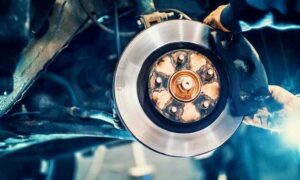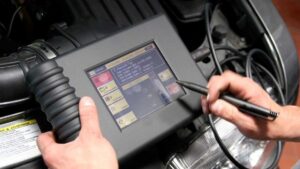When your car is in need of a Houston TX Brake Repair, Quality Mobile Service is the auto repair service you should call. Our mobile mechanics have been trusted by Houstonians for over a decade, and each one is dedicated to quality and honest work. You won’t find another repair service that is A+ quality without breaking the bank.
Quality Mobile Service wants to help you get your car back in working order so that you can get back to life in general. Becoming stranded on the side of the road while trying to figure out the car problem can be mentally stressful and frustrating. Fortunately, our team is here to help. When you place a call to our mobile mechanic unit, we will work hard to get to you as quickly as possible. Our dedicated professionals are motivated to help every client get their car in the best working order.
Have car troubles on the road can quickly place you in a dangerous situation. For instance, brakes that are overheating or not functioning properly can cause panic and fear in drivers. If this happens to you, the best option is to pull over to a safe place then call Quality Mobile Service.
How Does the Braking System Work?

The braking system on your car is a very sensitive and delicate system that is designed to bring your vehicle to a steady halt, even from high speeds. Early in the 20th Century, brake systems were made up of a series of pulleys and cables. The problem was that these cables could snap at any moment, leaving the driver without a way to stop their vehicle.
Gradually, auto mechanics and engineers developed a solution to this outdated and often ineffective braking system: hydraulic brakes. Hydraulic brakes are considerably safer and more durable. When the gas pedal is compressed, hydraulic fluid is released from a master cylinder that is attached to two brake lines. The fluid travels through the brake lines to each tire. Then the brake caliper squeezes both sides of the brake assembly, using friction to bring it to a halt.
Discs Brakes
Disc brakes are composed of several primary parts: pad, rotor, and caliper. When hydraulic fluid is released into the brake lines, it travels to each of the wheels. This pressurized fluid pushes the caliper out so that it pushes against the inside brake pad. From there, the brake pads on both sides grip the rotor and bring the car to a stop. Disc brakes are considered by many experts to be the safest brake system available. There are many types of brake pads and rotors on the market, so be sure and ask your mechanic about which type is right for your vehicle.
Drums Brakes
Drum brakes are rarely used on the front axle of the vehicle. Instead, these brakes are typically placed on the rear two tires because they harness less stopping power than disc brakes. Like disc brakes, drum brakes have an assembly of several different parts. A hollow brake drum holds the brake shoe, which, when the brakes are engaged, expands against the side of the drum. This causes enough friction to bring the car to a stop. As long as the front tires are equipped with disc brakes, the rear brakes will not work as hard.
Reasons Your Brakes Might Fail

A lack of proper maintenance can cause a slow decline in how well your vehicle works. Brake failure rarely happens out of the blue. In fact, most of the time, it happens over the span of several months or a year. This maintenance is the key to avoiding damages to your car or to other people. Suppose your brakes go out while driving; it is best to stay cool and calm. Once you have pulled into a safe location, reach out to a towing or roadside assistance service.
There are many warning signs you can look out for when determining whether your car has brake problems. For instance, do you hear squealing coming from the brakes? Or, perhaps your vehicle is vibrating as you come to a stop. These are both telltale signs that your vehicle’s brake system might be failing. To diagnose and remedy the problem, be sure and call the mobile mechanic service you can trust: Quality Mobile Service.
Avoid Brake Failure with an Inspection
There are easy steps you can take to avoid brake failure on your car. Most mechanics will recommend bringing your car in once a year for a brake inspection. Failing to do so will almost always results in hefty repair bills over time and could leave you without a car. So, you might be wondering what happens during a brake inspection.
During the inspection, your mechanic will examine the rotors, pads, and calipers on your brake assembly, along with other relevant parts. If these parts exhibit significant signs of wear and tear, the mechanic will likely recommend replacing them. There are, of course, other parts of the braking system that are not attached to the wheels.
For instance, a hydraulic braking system sends pressurized fluid to each wheel, after which the brakes are engaged. Another part of the brake inspection will include looking over the brake lines and checking the brake fluid levels. Your mechanic will discuss in detail what the issues appear to be and what your options are to fix those problems.
Houston TX Brake Repair

When you are searching for Houston TX Brake Repair, don’t hesitate to contact the professional mechanics at Quality Mobile Service. Our team will help you whether you are stranded on the side of the road or in your driveway. We can handle a multitude of jobs like brake, suspension, and engine repairs. Additionally, our mechanics can complete simple tasks like changing a dead battery, replacing worn tires, or overheating of the engine.
If you would like more information about Quality Mobile Service, our services, or a free quote, visit our website! Our location is wherever you are. Call Quality Mobile Service today for an affordable and quality Houston TX Brake Repair.
Houston, TX Fun Facts:
- There is an underground tunnel system beneath most of Downtown Houston.
- Sam Houston is the namesake of this city.
- Houston is the 6th largest city, population-wise, in the nation.
- The Port of Houston offers free 90-minute boat rides through the ship channel.
- For more information about Houston, TX, visit the city’s website!
